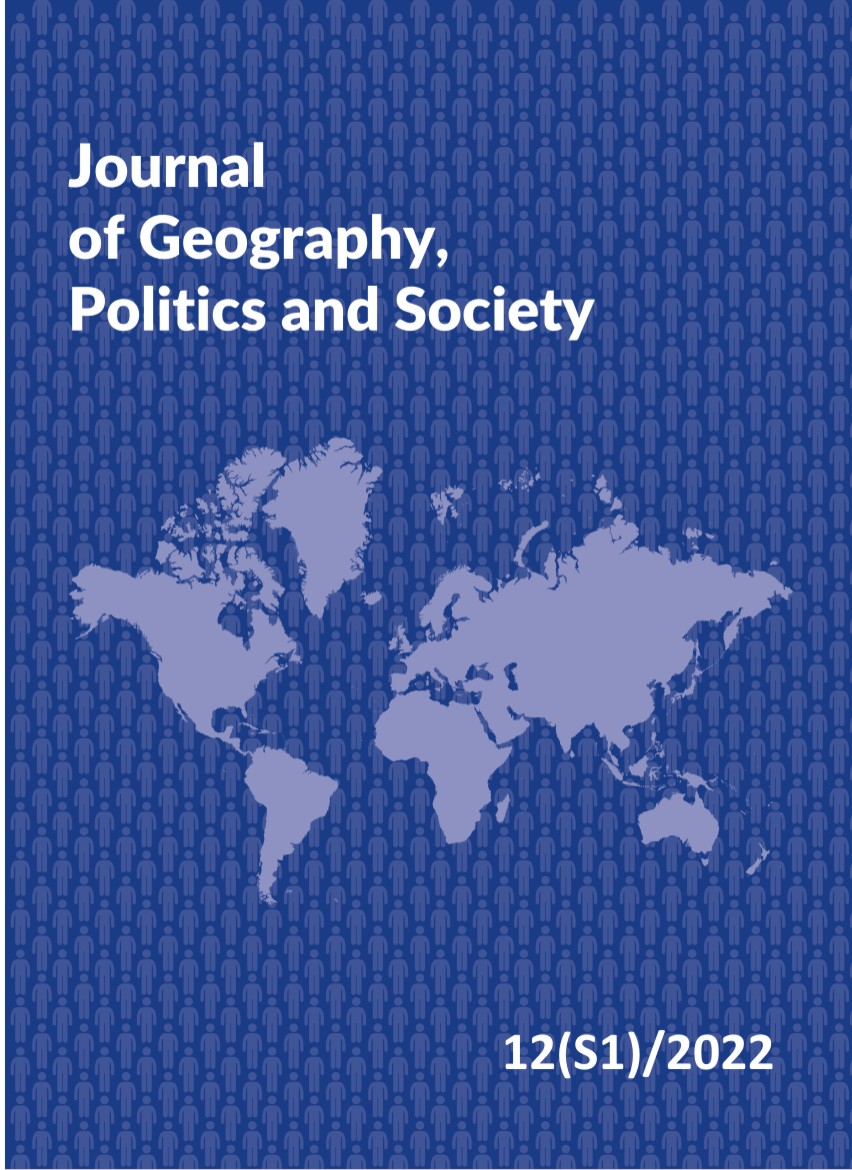Basic differences between Ukrainian and Russian political identities
DOI:
https://doi.org/10.26881/jpgs.2022.S1.02Keywords:
Ukrainian political identity, Russian political identity, national identity, identity, political culture, Maidan, Ukraine, Russia, MuscovitesAbstract
The article is devoted to identifying key differences between Ukrainian and Russian political identities. It is ascertained that the basic parameters for Ukrainian political identity are individualism, rejection of the authoritarian principle, love of freedom, etc. The idea of freedom has been long embedded in the mentality of Ukrainian people. By contrast, as regards the Russian people (Muscovites) mentality, slavish obedience has long been considered a virtue. According to eyewitnesses, Muscovites considered deception to be a proof of great intelligence. They are not ashamed of lying.
Ukrainian political identity representatives should not be expected to automatically submit to the authorities, as the reputation and legitimacy of the leader are important for them. Ukrainians can force an illegitimate official who is also acting illegally to relinquish the power.
The bearers of Russia’s political identity are dominated by the need for a supreme leader who will make all important decisions on his own. This state of Russian political culture, where decision-making is delegated only to rulers, and the role of the population is to implement these decisions, is determined by long-standing practices of authoritarianism. Atomization, that is, the disunity of society, is one of the dominant features of Russia’s political identity nowadays. Due to the atomization of society and people being unable to trust each other, all sorts of significant protests or rallies in Russia are impossible.
Downloads
References
Fukuyama F., 2006, Sil’noye gosudarstvo: Upravleniye i mirovoy poryadok v XXI veke (Eng. Strong State: Governance and World Order in the 21st Century), Izdatel’stvo «AST», Izdatel’stvo «AST MOSKVA», «HRANITEL’», Moskva.
Gray J., 2003, Pominki po Prosveshcheniyu. Politika i kul’tura na zakate sovremennosti (Eng. Enlightenment’s Wake: Politics and Culture at the Close of the Modern Age), Izdatel’stvo Praksis, Moskva.
Grosul V.Y. (ed.), 2000, Russkiy konservatizm XIX stoletiya: ideologiya i praktika (Eng. Russian conservatism of the 19th century: ideology and practice), Izdatelstvo Progress-Traditsiya, Moskva.
Guibernau M., 2012, Identychnist’ natsiy (Eng. Identity of Nations), Vydavnytstvo Tempora, Kyiv. Horbulin V.H. (ed), 2017, Svitova hibrydna viyna: ukrayins’kyy front (Eng. World Hybrid War: Ukrainian Front), Natsional’nyy instytut stratehichnykh doslidzhen’, Kyiv.
HösleV, Krizis individual’noy i kollektivnoy identichnosti (Eng. The Crisis of Individual and Collective Identity), Voprosy filosofii, 10, 112–123. Korb J.G., 1701, Diarium itineris in Moscoviam Perillustris (Eng. Diary of a trip to Moscow), https://dbc.wroc.pl/dlibra/publication/152048/edition/109708/content?ref=L3B1YmxpY2F0aW9uLzIxMDY0L2VkaXRpb24vMTg4MDY (accessed 18 March 2022).
Kuts H.M., 2007, Problematyka identychnosti v liberal’nomu konteksti (Eng. Issues of identity in a liberal context), Pytannya politolohiyi, 785, 79–85.
Kuts H.M., 2011, Liberal’ni transformatsiyi politychnoho prostoru (Eng. Liberal transformations of the political space), Vydavnytstvo Virovets A.P. «Apostrof», Kharkiv.
Kymlicka W., 2001, Liberalizm i prava menshyn (Eng. Liberalism and Minority Rights). Vydavnytstvo «Tsentr Osvitnikh Initsiatyv», Kharkiv.
Kyrydon A., 2017, Yevropeys’ka identychnist’: opryyavnennya v umovakh hlobalizatsiyi (Eng. European identity: manifestation in the context of globalization), [in:] Hlobalizovanyy svit: vyprobuvannya lyuds’koho buttya: materialy mizhnarodnoyi naukovo-teoretychnoyi konferentsiyi (Zhytomyr, 6–7 zhovtnya 2017 r.) (Eng. The globalized world: the test of human existence: International. scientific -theoretical Conf., Zhytomyr, October 6–7. 2017 – Zhytomyr), Vydavnytstvo Yevenok O.O., Zhytomyr, 35–42.
Melnyk V.P. (ed.), 2014, Politolohiya: entsyklopedychnyy slovnyk (Eng. Political science: encyclopedic dictionary), Vydavnytstvo LNU imeni Ivana Franka, L’viv.
Modzheyevski A., 2008, Pro yevropeys’ku sutnist’ Ukrayiny u vchenni Papy Ryms’koho Ivana Pavla II (Eng. On the European essence of Ukraine in the teachings of Pope John Paul II), Istoryko-politychni problemy suchasnoho svitu, 17–18, 132–137.
Oharkova T., 2016, «Ukrayina – tse Yevropa v miniatyuri» – interv’yu z nimets’kym istorykom («Ukraine is Europe in miniature» - an interview with a German historian), Hromadske, https://hromadske.ua/posts/nimeckii-istorikkarl-shlogel-knizhka-ukraina (accessed 18 March 2022).
Rushchenko I.P., 2015, Rosiys’ko-ukrayins’ka hibrydna viyna: pohlyad sotsioloha (Eng. Russian-Ukrainian hybrid war: the opinion of a sociologist), Vydavnytstvo FOP Pavlenko O.H., Kharkiv.
Smith A.D., 1994, Natsional’na identychnist’ (Eng. National Identity), Vydavnytstvo Osnovy, Kyiv.
Starodubs’ka M., 2022, Khytrospletinnya indyvidualizmu ta kolektyvizmu: Chomu Rosiya rozumiye lyshe sylu i ne ye «brats’kym» narodom Ukrayini (The intricacies of individualism and collectivism: Why Russia understands only power and is not a «fraternal» people of Ukraine), Ukrayins’ka Pravda, https://www.pravda.com.ua/columns/2022/03/27/7334943/ (accessed 18 March 2022).
Strategikon Mavrikiya, 2004, (Eng. Strategikon of Maurice), Aleteya, Sankt-Peterburg. Thompson E.M., 2006, Trubadury imperiyi: rosiys’ka literatura i kolonializm (Eng. Troubadours of the Empire: Russian Literature and Colonialism), Vydavnytstvo Solomiyi Pavlychko «Osnovy», Kyiv.
Tsekhmistro I.Z. (ed.), 2003, Yevropeys’ka ta ukrayins’ka kul’tura v narysakh (Eng. European and Ukrainian culture in essays), Vydavnytstvo Tsentr navchal’noyi literatury, Kyiv.
Vakulova T., 2014, Identychnist’ (Eng. Identity), [in:] N.M. Homa (ed.), Politolohiya: navchal’nyy entsyklopedychnyy slovnyk dovidnyk dlya studentiv VNZ I-IV rivniv akredytatsiyi (Eng. Political science: didactic encyclopedic dictionary for students of the VNZ I-IVth accreditation grade), Vydavnytstvo «Novyy Svit – 2000», L’viv, 237–238.
Wallerstein I., 2003, Posle liberalizma (Eng. After liberalism), Izdatel’stvo Yeditorial URSS, Moskva. Yakhtenfuks M., Kolyer-Kokh B. (eds.), 2007, Yevropeys’ka intehratsiya (Eng. European integration), Vydavnychyy dim «Kyyevo-Mohylyans’ka akademiya», Kyiv.
Yakubina V., 2014, Identyfikatsiya/identychnist’ (identychnist’ u merezhi) (Eng. Identification / identity (network identity)), [in:] N.M. Homa (ed.), Politolohiya: navchal’nyy entsyklopedychnyy slovnyk dovidnyk dlya studentiv VNZ I-IV rivniv akredytatsiyi (Eng. Political Science: textbook. Encyclopedic dictionary guide for university students of I-IV levels of accreditation), Vydavnytstvo «Novyy Svit – 2000», L’viv, 235–236.
Zakaria F., 2004, Budushcheye svobody: neliberal’naya demokratiya v SSHA i za ikh predelami (Eng. The Future of Freedom: Illiberal Democracy in the US and Beyond), Izdatel’stvo Ladomir, Moskva.
Zinchenko O., 2016, Navishcho potribni ukrayintsi abo Yak rozirvaty kolo istoriyi (Eng. Why do we need Ukrainians or How to break the circle of history), Dzerkalo tyzhnya. Ukrayina, 29, https://dt.ua/HISTORY/navischo-potribniukrayinci-abo-yak-rozirvati-kolo-istoriyi-mi-zakrivayemostolitni-geshtalti-i-nagaduyemo-yevropi-pro-yevropu-_. html (accessed 18 March 2022).

 Academic Scientific Journals
Academic Scientific Journals




